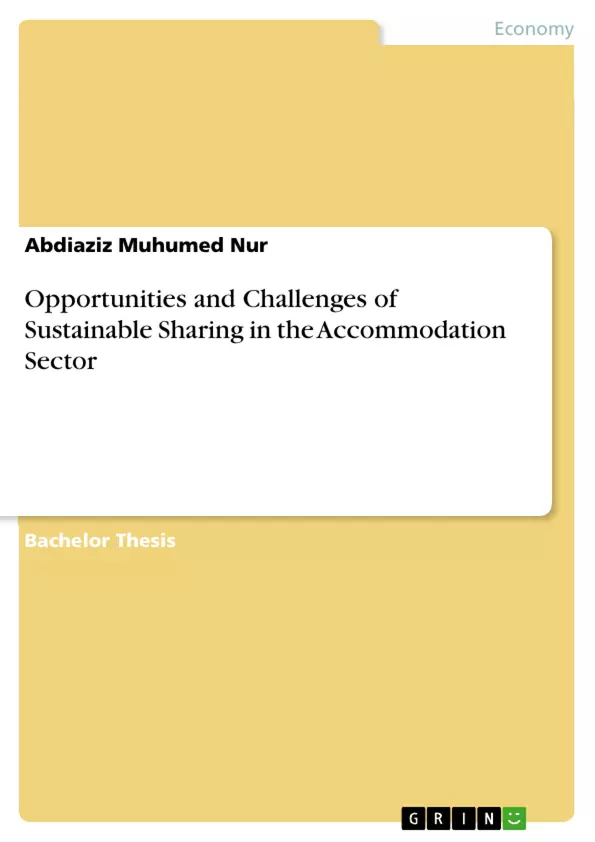The purpose of this paper was to examine the long-term viability of three different accommodation sharing platforms (Airbnb, Fairbnb, and Couchsurfing) by evaluating the literature and other source materials available. These platforms' potential and challenges have been highlighted, as well as how each of these platforms contributes to various elements of sustainability. The results indicate that these platforms play different roles in various elements of sustainability. These platforms reduce overproduction and consumption by utilizing spare bedrooms and reducing the need for new hotel constructions. They also make travel more affordable, provide income opportunities (Airbnb & Fairbnb), and promote social interactions. However, they do have certain drawbacks as well. Low-cost travel may encourage people to travel more, resulting in higher CO2 emissions, which may have more negative than positive consequences. However, as shown by the effects of several regulations adopted by different cities, such adverse impacts can be minimized with strict government regulations. Nonetheless, while effective and suitable regulation might help to mitigate the negative effects of these platforms, it is difficult to estimate their exact sustainability repercussions. As a result, this paper calls for a more open examination of accommodation sharing services.
Inhaltsverzeichnis (Table of Contents)
- Abstract
- Table of Contents
- List of Tables
- Introduction
- Sharing Economy: Overview
- Development of Sharing Economy
- Economic Perspective on the Sharing Economy
- Social Perspective on the Sharing Economy
- Ecological Perspective on the Sharing Economy
- Sharing in Housing Sector
- Development of Sharing Concept in Housing
- Example 1: Airbnb
- The Rise and Growth of Airbnb
- Business Model
- Example 2: Fairbnb
- The Rise and Growth of Fairbnb
- Business Model
- Example 3: Couchsurfing
- The Rise and Growth of Couchsurfing
- Business Model
- Opportunities and Challenges of Accommodation Sharing Platforms
- Sustainability in Accommodation Sharing
- The Concept of Sustainability
- The Economic Perspective
- The Social Perspective
- The Ecological Perspective
- How Sustainable are Accommodation Sharing Platforms?
- Airbnb
- Fairbnb
- Couchsurfing
- Recommendations
- The development and impact of the sharing economy
- Sustainability in the context of the accommodation sector
- The economic, social, and ecological benefits and drawbacks of accommodation sharing platforms
- The role of government regulations in mitigating the negative impacts of accommodation sharing
- The need for further research to evaluate the long-term sustainability of these platforms
Zielsetzung und Themenschwerpunkte (Objectives and Key Themes)
This bachelor thesis examines the long-term viability of the sharing economy in the accommodation sector. It focuses on analyzing the opportunities and challenges presented by three different accommodation sharing platforms: Airbnb, Fairbnb, and Couchsurfing. The thesis explores the role of these platforms in promoting sustainability from economic, social, and ecological perspectives. The main objective is to understand the impact of these platforms on sustainable development and resource efficiency.
Zusammenfassung der Kapitel (Chapter Summaries)
The thesis begins by providing a comprehensive overview of the sharing economy, exploring its development and its economic, social, and ecological dimensions. It then dives into the specific context of accommodation sharing, analyzing the rise and business models of Airbnb, Fairbnb, and Couchsurfing. Chapter 3 also examines the opportunities and challenges associated with these platforms, considering their potential impacts on the tourism and hospitality industries.
Chapter 4 delves deeper into the concept of sustainability, exploring its economic, social, and ecological facets. It investigates how accommodation sharing platforms contribute to or detract from sustainability by examining their impact on resource consumption, economic development, and social interactions.
Schlüsselwörter (Keywords)
The main keywords of this thesis encompass the sharing economy, accommodation sharing, sustainability, Airbnb, Fairbnb, Couchsurfing, and the role of government regulations in shaping the development and impact of these platforms.
Frequently Asked Questions
Which accommodation platforms are analyzed in this paper?
The paper examines Airbnb, Fairbnb, and Couchsurfing to evaluate their long-term viability and impact on sustainability.
How do sharing platforms contribute to ecological sustainability?
They reduce overproduction by utilizing spare bedrooms and decreasing the need for new hotel constructions, though they may also increase CO2 emissions due to lower travel costs.
What are the economic benefits of platforms like Airbnb and Fairbnb?
These platforms make travel more affordable for consumers and provide income opportunities for hosts.
What role does government regulation play in accommodation sharing?
Strict government regulations are shown to minimize adverse impacts, such as negative social or ecological consequences, making the platforms more sustainable.
What is the difference between the business models of the studied platforms?
The paper explores the rise and specific business models of profit-oriented services like Airbnb versus more community-focused or sustainable alternatives like Couchsurfing and Fairbnb.
- Quote paper
- Abdiaziz Muhumed Nur (Author), 2022, Opportunities and Challenges of Sustainable Sharing in the Accommodation Sector, Munich, GRIN Verlag, https://www.grin.com/document/1373639



